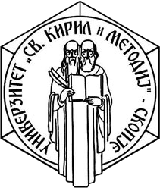Објавено на:
26/11/2013
На 28.11.2013 година во 12 часот во амфитеатарот на ТМФ во организација на Асоцијата ИКТ-АКТ, ФИНКИ и со поддршка на IEEE comp society секцијата на Македонија, ќе се одржи предавање на ALexandru I. Nicolin, истражувач во Horia Hulubei National Institute for Physics and Nuclear Engineering, Romania. Насловот на предавањето е „High-Performance Computing investigations into the nonlinear dynamics of Bose-Einstein condensates“. Апстрактот на предавањето можете да го прочитате во текстот што следува.
High-Performance Computing investigations into the nonlinear dynamics of Bose-Einstein condensates
Abstract: The experimental realisation of the first atomic Bose-Einstein condensates back in 1995, seven decades after the theoretical prediction, marks the emergence of a new and exciting research field which brings together scientists from areas as different as nuclear physics, nonlinear optics, theoretical mechanicс, numerical analysis and computer science to name only a few. In recognition of the impact of this extraordinary experimental achievement, the heads of the experimental groups who first achieved the Bose-Einstein condensed state of matter were awarded the 2001 Nobel Prize in Physics. As most theoretical investigations into the nonlinear dynamics of Bose-Einstein condensates rely on solving a nonlinear partial differential equations, the so-called Gross Pitaevskii equation which describes the 0 K dynamics of the condensate, there have been many works dedicated to its numerical and analytical solution. To this end, methods specific to high-performance computing have been used to develop fully-paralelized numerical solvers in C++ and Fortran that employ OpenMP and MPI strategies, as well as hybrid solvers which allow approximate analytic solutions of arbitrary precision. In this talk I will overview the fruitful contributions of computer scientists to this field and will detail a series of novel results concerning the analytic solution of the Gross-Pitaevskii equations by means of genetic algorithms.

